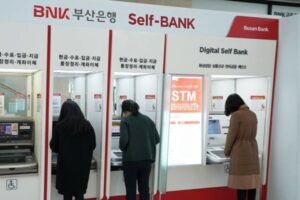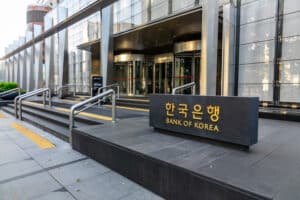Here are the 10 best banks in South Korea; the one you need might just be in this list.
If you want to invest as an expat or high-net-worth individual, which is what I specialize in, you can email me (advice@adamfayed.com) or use WhatsApp (+44-7393-450-837).
We recommend that most wealthy locals and expats invest offshore despite this list, and we can help with that.
Banking in South Korea
The Financial Services Commission (FSC) and the Financial Supervisory Service (FSS) govern the banking and non-banking financial institutions that make up South Korea’s financial system (FSS). During the 1980s, South Korea had a varied commercial banking system, a securities market, and secondary financial institutions.
The construction of the modern South Korean banking system began in late 1878, and the National Bank of Japan established a branch in South Korea around this time. The year 1997 to 2002 was a period of reorganization in the banking industry of South Korea.
In South Korea, there are 52 commercial banks with international branches, 5 specialty banks, and 79 mutual savings banks. The Bank of Korea is South Korea’s central bank, founded in 1950 with KRW 1.5 billion in capital. In collaboration with the government, the bank establishes price stability and oversees the country’s monetary and credit policies.
It also prints and distributes banknotes and coins. Foreign capital markets’ introduction into the Korean banking industry was critical in helping the country’s banking sector transition from insolvency to profitability.
Moody’s outlook on the Korean banking sector is stable, having moved from negative in December 2017, and the credit profile of Korean banks is expected to remain strong over the next 12-18 months.
Structure of Banks in South Korea
Banks in South Korea are classified into three types: –
- Commercial banks: In South Korea, 52 commercial banks provide services to local consumers.
- Specialist banks: Only 5 specialized banks offer services to a specific consumer sector.
- Mutual savings banks: South Korea has the most mutual savings banks, at 91.
The Financial Supervisory Services regulates and controls banks (FSS). The Bank of Korea is the country’s central bank, issuing Korean Won and ensuring price stability.
10 Best Banks in South Korea
1. Shinhan Financial Group
Shinhan Financial Group (SFG) offers a comprehensive range of consumer and business banking services. Individuals, corporations, and other financial institutions can use its services including trust banking, securities brokerage, and asset management. The bank had a profit worth KRW 3,157 billion in 2018, which was greater than the same time the previous year.
In South Korea, the bank has about 1,038 branches and serves a total of 15 million people. The bank operates in 19 countries and was named Asia-best money’s bank in 2017. SFG employs over 27,000 people. The bank was placed fourth among financial businesses on the World Economic Forum’s 2018 Global 100 Most Sustainable Corporations in the World list, which was announced in Davos.

2. KB Financial Group
KB Financial Group was formed in 2008 by the merger of Kookmin Bank & Housing and a commercial bank, both of which were founded in 1964 and 1967, respectively. Group is Korea’s top financial services provider, offering a wide variety of financial goods and services. There are 12 subsidiaries that operate under the KB Financial Group. It has offices in Asia, Europe, America, and Oceania to provide services to clients all over the world.
KB Financial Group’s net profit fell by 7.3 percent to KRW 3,068 billion in 2018. At the end of December 2018, the bank’s total assets were at KRW 479, 601, 3 billion. For the very first time in the banking sector, December bank was ranked top in the national customer satisfaction rating 12 times in 2018.
3. Hana Financial Group
Hana Financial Group was founded in 1971, and the firm now employs 19,194 people in South Korea, with almost 1,053 branches both domestically and internationally. South Korean consumers may rely on the Group for a wide range of financial products and services.
As of December 2018, the bank’s total assets were KRW 385,009 billion, and its net operating income was KRW 7,821 billion, which was higher than in 2017. For the third year in a row, the group got the FSS governor award for its one-company-one-school financial education effort.
4. NongHyup Financial Group
The Agricultural Bank and Agricultural Federation merged to become NongHyup Financial Group. The group’s mission is to provide financial services to farmers in order to promote their satisfaction and growth.
With Korea’s biggest domestic professional network, the Group offers a wide range of financial services. Groups achieved an all-time high profit of 1.22 trillion won in 2018, which is 41.8 percent greater than the previous year over the same period. Total assets for the group climbed by 7.3 percent year on year to 417 trillion won.
The group works through a network of 1,200 locations and offers personal banking, business finance, cards, and other services.
5. Woori Financial Group
Woori Financial Group was founded to help the country’s economy grow. This year marks the bank’s 120th anniversary as one of South Korea’s premier commercial banks. Due to an increase in costs, Woori bank earnings decreased by 13.3% in Q4 2018 compared to the same time in 2017.
From KRW 355 billion in operating income, it fell to KRW 170 billion. The entire value of the group’s assets is 18 trillion won. Salary, savings, fixed deposit, home loans, policy loans, and other financial services are available through the group. In 2018, the bank was recognized as one of the best financial institutions for client safety.
6. Korea Development Bank
The Korea Development Bank was established in 1954 under the Korea Development Bank Act, with the primary purpose of supplying and managing substantial industrial capital and assisting in the development of Korean industry and the economy.
Corporate loans, equity investments, public or corporate bonds, and guarantees such as payment guarantee, debt guarantee, bond guarantee, and so on are only some of the products and services offered by banks.
In June 2018, KDB’s total assets were KRW 216,726.286 billion, down from KRW 216,726.286 billion in March. KDB has 77 domestic and 9 international branches, as well as 5 subsidiary and 8 representative offices.
7. Industrial Bank of Korea
Industrial Bank of Korea was founded in 1961 to provide corporate banking, global markets, retail banking, treasury, corporate, and investment banking services in South Korea. The bank employs 13,000 people and is managed by IBK through a network of 630 domestic branches and almost 18 abroad locations.
As of December 2018, the bank’s total assets were KRW 289,510 billion, with a net profit of KRW 304 billion and a profit margin of 17.59 percent. The number of corporate clients at the bank has surpassed 1.3 million. By 2020, the bank’s goal is to become Asia’s best performing SME finance bank.
8. DGB Financial Group
It is one of South Korea’s leading regional banks, providing services such as deposits, personal loans, and business loans, as well as automotive finance, insurance products, asset management, and internet banking.
According to Bloomberg, total bank assets as of December 2018 were KRW 65,041 billion, with net income of KRW 113 billion and a profit margin of 7%. In 2018, the bank achieved a net profit of KRW 383.5 billion, which is 26.9 percent greater than the previous year during the same time.
9. BNK Financial Group
BNK Financial Group (formerly BS Financial Group Inc.) was founded in 1967 and offers deposit, investment brokerage services, asset management, as well as credit financing and mutual saving banking services.
In 2018, groups reported net earnings of KRW 502.1 billion, a 26.4 percent increase over the previous year during the same time, and total assets with the group at the end of Q4 2018 were KRW 119,001.80 billion. As of December 2018, BNK had 498 locations. As of March 2018, BNK Financial Group’s credit rating with Moody’s was stable.

10. Kakao Bank
In South Korea, Kakao Bank offers internet-based financial services. It provides Overseas Customers with services such as payments and settlements, deposits, loans, and customer support, as well as lending and saving services. Korea Investment Holdings Co, Ltd. is the parent company of Kakao Bank.
It is the only bank with over 21 million registered users and a capital of KRW 800 billion as of January 2018. Despite receiving tremendous support in the first month of its launch, Kakao Bank lost KRW 12 billion in the first half of 2018.
Advice if You Want to Open a Bank Account in South Korea
So, as a non-resident, how do you create a bank account in South Korea? Because South Korea is a very popular destination for expats, particularly young expats wishing to teach English for a few years, setting up a bank account as a foreigner is very straightforward.
You must go to the bank in person to open a bank account in Korea. It is not feasible to open an account online. The only method to open a bank account in Korea without physically visiting a bank is to have an account with an international bank with branches in Korea.
To open a bank account, no appointment is necessary. Simply bring all of your essential documents to the bank, choose a queue ticket, and wait your time until it’s your turn. Banks in bigger cities like as Seoul and Busan will have a substantial number of English-speaking employees.
If you live in a more remote area of Korea, you would have to wait for an English-speaking member of staff to become available. There may just be one, depending on factors such as the the size of the town or bank branch, so be flexible if you visit on a day when that person is not at work.
Conclusion
Banks in South Korea function similarly to those in Europe and North America, owing to the country’s popularity among expats. Financial institutions are also used to working with foreigners, so you shouldn’t have too many issues just because you’re not a resident. Some banks also cater to foreigners with special services.
Pained by financial indecision?

Adam is an internationally recognised author on financial matters with over 830million answer views on Quora, a widely sold book on Amazon, and a contributor on Forbes.



